Launch of Hydro Nation Energy Innovation Programme
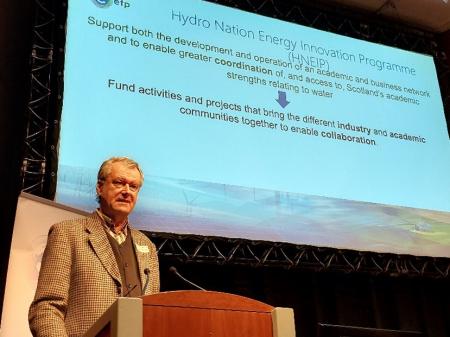
At World Water Day this year (22nd March 2023), the Hydro Nation Energy Innovation Programme (HNEIP) officially launched. Check out the World Water Day video here: https://youtu.be/v8dFM7-ZQhc
The HNEIP is a new four-year programme funded by the Scottish Government that will coordinate a wide range of academic expertise to support Scotland’s water industry to develop innovative new products and approaches to help drive down emissions.
Read the full story here: Launch of new innovation programme to support the reduction and elimination of carbon emissions in the water supply sector (etp-scotland.ac.uk)
World Water Day 2023 Recap
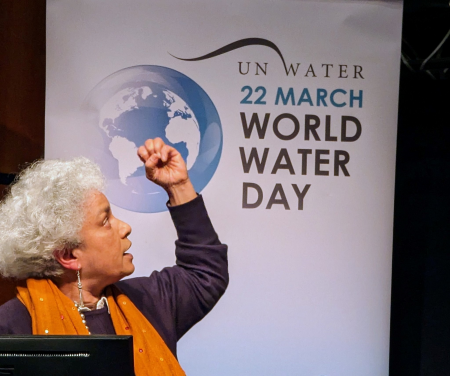
World Water Day – Edinburgh 22 March 2023
On World Water Day Scotland joined the global water community on March 22nd World Water Day with a hybrid event on the theme of ‘Accelerating Change through Partnerships and Cooperation.
The CREW team attended the World Water Day Conference held in Edinburgh. This year’s conference was led by Hydro Nation International Centre, with support from CREW, The James Hutton Institute, the Hydro Nation Scholars, and the Scottish Government.
The speakers and attendees were challenged to ‘Be the change you want to see in the world’ recognising the role of water as a catalyst for that change across these five sub-themes:
- Water and health
- Water and sustainable engineering
- Water and digitalisation
- Water and international cooperation
- Water and policy
The plenary sessions focussed on how emerging research is translated to ‘settled science’ that can inform policy. From wastewater testing for the presence of COVID-19 to scientific research of emerging contaminants such as PFAS, microplastics, and emerging concerns like anti-microbial resistance. View the Full Programme here and the Policy Brief here, containing the key messages from the day.
CREW held its second Annual CREW Lecture following the World Water Day Event, with a keynote from renowned international expert on participatory projects, Minni Jain, who challenged us all to:
‘Speak the language of water to regenerate, rejuvenate and return the water cycles on our planet to health again.’
Leading Ideas Hub!

In September 2022, CREW attended the Leading Ideas Hub at The Royal Botanic Garden Edinburgh, a two-day event organised by SEFARI Gateway. The event brought together a range of professionals to share ideas and advice on best knowledge exchange practice. It was a great opportunity to meet other scientists, policy advisors and stakeholders to explore methods, best practice and innovation in knowledge exchange.
Across the two days the presentations focused on five key themes: engagement, skills, collaboration, innovation and impact. The sessions were led by a diverse range of speakers that shared their wealth of experience from different perspectives, which enabled interesting and engaging panel discussions. The event ended with Knowledge Broker Julia Mitchell head of Knowledge Exchange and Impact at the Rowett Institute highlighting ‘This knowledge exchange event is not the end of the story for us: it's the beginning of many new connections and the next step in valuable collaborations’.
Sniffer Flood Risk Management Conference
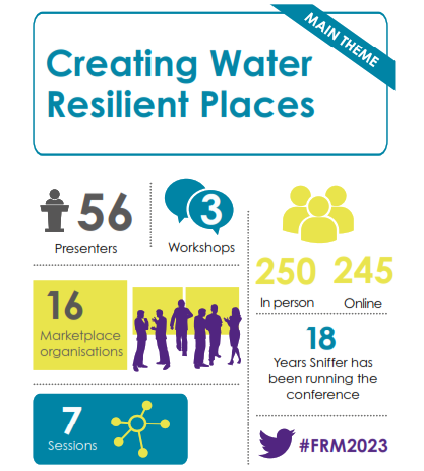
In February 2023, CREW attended the two-day Flood Risk Management Conference hosted by Sniffer in Perth. The theme of this year’s conference was ‘Water Resilient Places’ both from a policy and on the ground actions perspective. The hybrid conference included attendees from local and national government, research and higher education institutes, as well as relevant experts from consultancies.
The first morning’s plenary sessions ended with a panel discussion that highlighted current challenges in flood risk management. The challenges included recognising the need to listen to the community already experiencing risk and likely to experience more in the face of climate change, where is the funding for innovation in flood risk management coming from, and finally how to support healthy natural systems that can adapt to and help to mitigate these risks.
The second day’s plenary sessions focussed on flood warning, funding and finance considerations, and benefits that citizen science can bring. Case studies of local organisations working together with communities to find solutions highlighted the need to understand the challenges each faced and the need for a holistic plan-led approach.
The final panel discussion about ‘where to next?’ focussed on how we can break siloes of individual organisation data management and knowledge exchange strategies and build towards a catchment-based approach to flood risk management. This discussion strongly resonates with CREW’s vision to support a collaborative approach to knowledge exchange between government and research organisations.
Countdown to World Water Day 2023
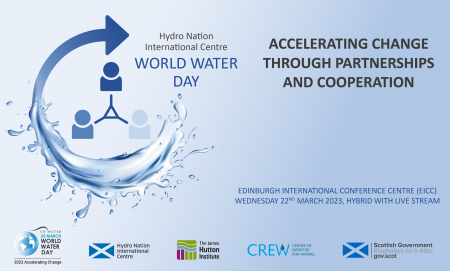
One week to go until World Water Day 2023 on 22nd March. Scotland joins the global water community with a hybrid event on the theme of ‘Accelerating Change through Partnerships and Cooperation’.
This conference aims to explore emerging trends and opportunities for water to act as a catalyst for accelerating change.
We will hear from a variety of speakers from policy, practitioner and research perspectives addressing 5 sub-themes with water as the cross-cutting connector:
-
Water and health
-
Water and sustainable engineering
-
Water and digitalisation
-
Water and international cooperation
-
Water and policy
In the evening there is the much-anticipated CREW Lecture with a keynote from renowned international expert on participatory projects, Minni Jain.


Hydro Nation Energy Innovation Programme - New funding

The Hydro Nation Energy Innovation Programme provides knowledge exchange to support low carbon Research and Innovation with Scottish Companies in the water industry.
The Scottish Government Hydro Nation Strategy is committed to making Scotland a 'Hydro Nation' where water resources are developed to bring the maximum benefit to the Scottish economy.
Within the Hydro Nation Strategy, the Hydro Nation Energy Innovation Programme (HNEIP), funded by the Scottish Government, offers Scottish businesses access to project funding to work with Scottish universities on projects that create products and services that reduce and eliminate carbon emissions in the water supply industry. Businesses can also access a wider portfolio of business support services.
Check out the website for further details and new funding opportunities.
Save the Date - HNIC World Water Day & CREW Lecture 22nd March 2023
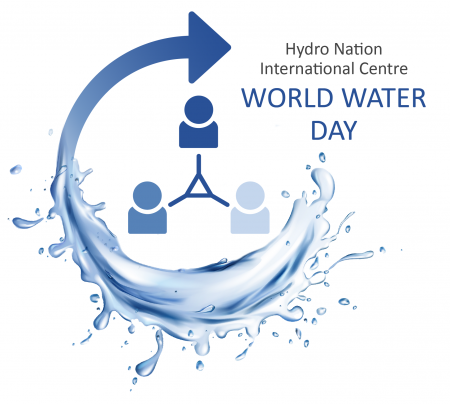
SAVE THE DATE
22nd March 2023
Edinburgh International Conference Centre (EICC), with live stream.
Free hybrid event is hosted by the Hydro Nation International Centre and supported by the Scottish Government and the James Hutton Institute.
Accelerating Change for a Water Sustainable Future
In December 1992, the United Nations General Assembly declared March 22 as World Water Day, and it has been celebrated annually since 1993. World Water Day 2023 marks an important moment, not only as the 30th anniversary of this observance, but also as the halfway point for the International Decade for Action, “Water for Sustainable Development” 2018-2028. At this crucial time, where we need to reaffirm our collective responsibility to the 2030 Agenda, this conference aims to explore emerging trends and opportunities for water to act as catalyst for accelerating change through intersectoral interactions, and the ways in which policy, research and innovation can come together to safeguard water sustainability and resilience worldwide.
Programme
An exciting programme of events, talks and more is currently being developed.
Registration
Details on how to register in person or online for this unique event will be posted here in the coming days.
Scotland’s Centre of Expertise for Waters (CREW) joins the OHBP steering group!

CREW is delighted to announce we are officially a member of the One Health Breakthrough Partnership (OHBP).
The OHBP was founded in 2017 and is a collaboration between scientists, utilities, regulators, public health specialists and policymakers, working together to tackle the interconnected challenges impacting the health of humans, nature and the environment. OHBP aims to sustainably balance and optimise health outcomes for all, leading to global health security and integrity of ecosystems.
As a Centre of Expertise, CREW will contribute our experience, operating at the science : policy interface, to build upon our foundational research and develop evidence-based policy that delivers improvements to water quality in Scotland and serve as a model worldwide.
The Water Quality and Health theme within the current CREW programme (2022-2027) closely aligns with the OHBP’s strategic objectives and primary focus on addressing pharmaceutical pollution in the environment. CREW will use our well-established links with stakeholders across the water sector and research community to raise awareness of pharmaceutical pollution and to promote positive action on medicine use and disposal, to reduce the risk of pharmaceutical pollution of Scotland’s water.
The benefits beavers may bring to Scottish rivers, streams and water resources

Beavers are well known for their ability to transform the environment through dam building and other activities. This CREW report, based on evidence from 120 studies of beaver populations worldwide, provides an evidence review of the role of beavers in modifying physical processes, and the potential benefits they may bring for Scottish rivers, streams and water resources. Beavers could make important contributions to improving the condition of Scotland’s rivers, helping to improve water supply and quality as well as creating habitat, sequestering carbon and restoring rivers.
Based on the findings of the report, riparian management appraisals should consider the potential for beaver activity to contribute to ecosystem services. However, discussion with landowners and wider societal groups is required to inform such appraisals and to help mitigate local adverse effects of beaver activity. The report conclusions have also contributed to the Implementation Plan of Scotland’s Beaver Strategy 2022-2045. The key findings of the report are summarised in the Policy Note.
The main report and policy note can be found here.
Photo credit Tomasz Chmielewski (2012). Available at https://commons.wikimedia.org/wiki/File:Castor_fiber_vistulanus.jpg
CREW celebrates 10 years since the launch of Scottish Canals and our ongoing partnership
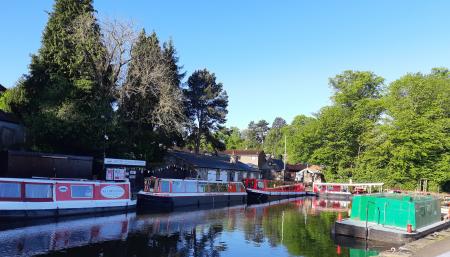
CREW celebrates 10 years since Scottish Canals launch as the public body responsible for maximising the benefits of Scotland’s canal network and surrounding environments.
CREW’S partnership with Scottish Canals supports transformation of these amazing assets, promoting sustainable growth, and access to opportunities for health and well-being. Crucially Scotland’s canal network offers solutions to climate change impacts such as managing surface water and sustainable transport routes. CREW’s research theme of ‘Hydrological Extremes, Coasts and Risk Management’ aligns with challenges facing Scottish Canals such as mitigating the impacts of climate driven flooding and soil erosion. Partnership working allows research to be shaped to provide knowledge that enables future management of these assets and to raise awareness of the benefits they provide to communities.




